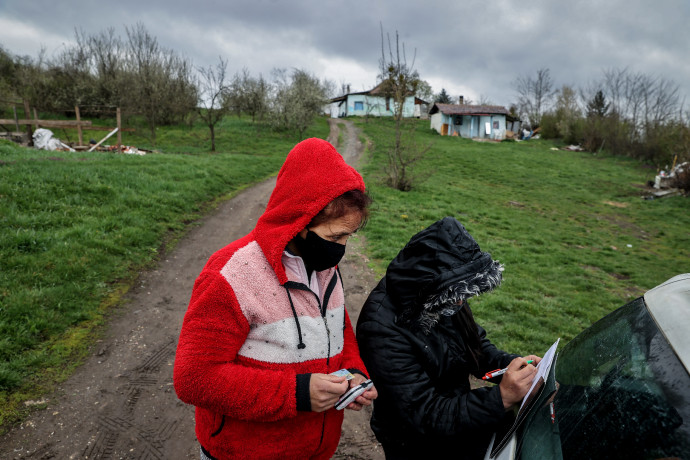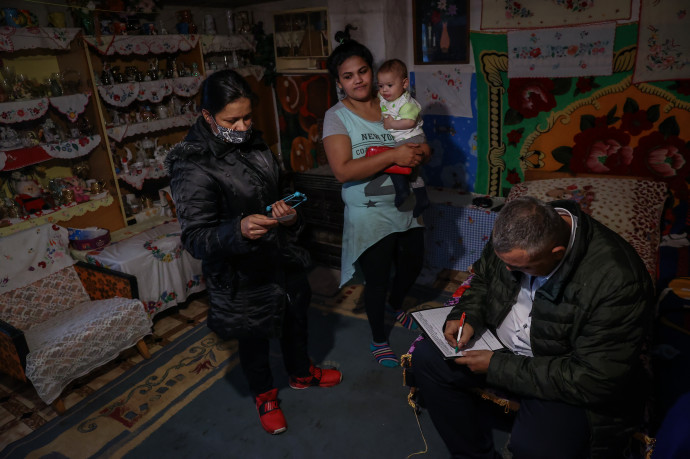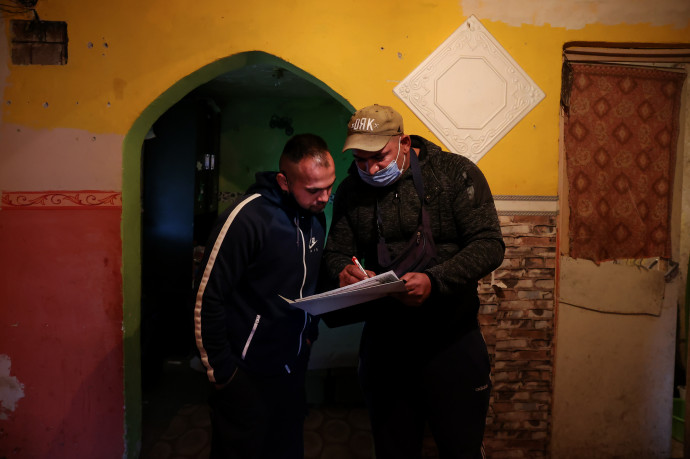'From what I've heard, the Russkie stuff is stronger' – The vaccination campaign in Hungary's segregated communities

A group of Hungarian civic organizations have launched a campaign called "Vaccines for Life" to encourage the country's disadvantaged Roma communities to sign up for the Covid-19 vaccine. According to the statistics, there are 1300 Roma segregates in Hungary, housing approximately 2.8 per cent of the country's total population. That is more than 200,000 people, a sizeable group. The campaign's organizers aim to reach 80 to 100,000 people. In the first round, volunteers will visit a hundred villages to provide locals with credible information on the vaccines and help them sign up for the jab. The participants are organizations like aHang, Dikh Tv, Romnet, the Roma Press Centre, Rendszerszint, Civil Kollégium Foundation, the 1 Hungary Initiative, and the National Roma Council.
Roma communities living below the poverty line in Hungary's segregates are a vulnerable group in many respects. Housing conditions in the estates are dismal; many households do not even have city water, which may further facilitate the spread of Covid-19. As a result of their social status, the general health of these communities is poorer than that of the majority society, while they have lower access to healthcare. There is no data on how the coronavirus had spread through the segregates, but Aladár Horváth, the Chairman of the Roma Parliamentary Association, said in a recent report that based on what he heard, the pandemic did not spare these communities in Budapest or the segregated villages either. As he told Reuters:
"Our people are dropping like flies."
On the other hand, we also heard of towns where even though the virus was present, hospital admittances were low, and there were no spikes in mortality either.
One of the reasons behind the creation of the "Vaccines for Life" campaign was that several factors are keeping Romas from getting vaccinated in large numbers. With many households lacking e-mail addresses or even access to the internet, signing up for the vaccine is a great difficulty in itself, if they even heard about the vaccines at all, since that is not necessarily a given in the estates. General awareness of the vaccines and the vaccination process is low, but fake news and misinformation still spread like wildfire. Low levels of education, the scarcity of information, and a general distrust of the healthcare system make these closed communities even more susceptible to them than the rest of Hungarian society, which is not exactly immune to the phenomenon.
We experienced that first-hand when we accompanied one of the volunteers working on the campaign on his visits to the people living in the segregates. Zsolt Barna visited poor neighbourhoods of Miskolc and the surrounding small towns in Eastern Hungary. His association, Együtt a Cigányságért (Together for the Roma Community), regularly hands out firewood, food packages, and clothes to families in need, and they are well aware of the area's social issues. "The minority council in Borsod county gave the local Romas no information about the vaccination process, what shots are available, and which ones are recommended for whom," Barna explained. The association started the campaign on Monday by visiting five or six families in a village near Miskolc.
The local Roma Council told them that no one wants to be vaccinated there, and their whole effort is pointless,
while residents elsewhere complained that nobody informed them about the pandemic or the vaccines.
She saw on Facebook that the vaccine causes rashes
Csilla lives with her parents and her three kids in Görömböly, a neighbourhood of Miskolc. A steep, winding dirt road leads to their house on the hill, but there is no point looking for a street number. She learned from Facebook that she could sign up for the vaccine, but she knew nothing about what kind of vaccines are available. A lot of what she sees online tells her how the vaccines are dangerous; Facebook groups she frequents are awash with such information.
"A lot of people post about how it causes rashes, makes you sick, and that it's dangerous, and then people share these. I don't know if it's the truth or not, the people there do not always post the truth."
Csilla complained that they get no information even from the local municipality: "Nobody told us if these vaccines are mandatory or not, or even asked us if we want them. Why is that? Honestly? They think that we are Romas, so we don't matter; they only inform the Hungarians."

Despite having some fears about the shot, she wants to get vaccinated. "It's because I don't want to catch the virus, and also because of my kids, my daughter is about to start kindergarten. We don't even dare to go to the playground; children keep touching the toys there, which never get sanitized." Her parents regularly go to work, so they are even more exposed to the virus. They heard that older people are more in danger, so they get vaccinated first. They haven't signed up yet, but Csilla says they want to. She hasn't heard of anyone falling ill within the family or in her social circle – some had a cold, but she says there was no Covid-19. She's been told that by now, the virus is not so dangerous, there aren't that many infections anymore, hospitals are getting empty. "Is it already the third wave? I have only heard of the second," she exclaimed when we discussed that the epidemic just peaked a couple of days earlier.
Don't come to your senses only when someone asks for your immunity card
Signing up for the vaccine takes only a couple of minutes; the volunteers enter the data into the system and even create an e-mail address for this purpose. They do this following a an online training session where a doctor advised them on which vaccine they can recommend to whom, in case it comes up at one of the families. "Stronger vaccines are generally not advised for people with cardiovascular problems or who are on dialysis. Everyone knows that certain vaccines could be risky in case of malnourishment or a compromised immune system." Csilla was told to choose Pfizer or Moderna when she gets the call for the appointment and to expect side effects such as a headache or a rise in body temperature, but she was reassured these would soon subside.
Nobody is forced to register. Everyone is free to decide; the volunteers tell people that the vaccine is not mandatory, Zsolt explains. "We also warn them not to come to their senses only when someone asks for their immunity card." Zsolt Barna and his wife already signed up two months ago. They haven't been called about their appointment yet.
Cecília Müller is a must-see, right after Dikh TV
Approximately three thousand people live in Lyukóvölgy, the country's largest segregate, located on the far side of Miskolc. Most residents are Romas; many of them settled here after the large Roma estate in Miskolc, the so-called "numbered streets" were demolished. Once littered with tidy weekend cabins, the area now gives home to people in staggering poverty. In the neighbourhood the size of a larger village, there are no shops, schools, pharmacies, and most households have no access to city water. We hardly see anybody on the muddy streets soaked by the driving rain; only a handful of people wait for their turn at the mobile shop stopped by one of the streets. Not many of them wear a mask.
The yard of Gábor's home in Lyukóvölgy – Photo: István Huszti / Telex
Gábor lives up the hill in Lyukóvölgy, raising his six children alone. Like many other locals, he works at the municipality, and his foreman convinced him to get the shot. He thinks it will eventually be mandatory anyway, and that is why he agreed to sign up. He doesn't want his children to be at a disadvantage. "I've heard about the Russkie one, that the active component in that is stronger, and the Chinese one is weaker." He heard this on the evening news, and he wants to go for the Chinese vaccine; he feels that is the less dangerous option. This rumour about the weaker Sinopharma vaccine is not entirely baseless; there have been cases in Hungary where people receiving that shot never developed proper immunity. Having heard many bad things like people dying of vaccinations, Gábor is mistrustful of the jab, and he wouldn't yet vaccinate his children. None of Gábor's friends got infected, his children didn't catch the virus either, although nobody ever tested any of them.
"We had no symptoms. Some of the kids did have fever, but it passed."
His colleague, Gyuszi, is more sceptical, convinced that Covid-19 was present in Lyukóvölgy. He was surprised that not a single person was quarantined in the estate throughour the pandemic; he never saw the typical red sticker on any doors. "There were times when I felt weak and had a fever too. I called the doctor, who told me to wait a few days and see what happens. I thought they would send me the red sign." He thinks some kept their illness a secret because if people knew, they couldn't go to work, do groceries, or take the kids to school.
Two of his relatives work at the Covid-ward of the local hospital. One of them is a cleaner, and the other delivers food to patients. Due to this, he is well aware that people die of the disease every day. He is sure that people do not take the pandemic seriously because they do not meet infected people, and they don't hear about deaths. This is why it would be good if a doctor explained to them what this vaccine is about and everything else they need to know, he told us. He follows what is happening, the public media's evening news is a must-see for his entire family.
"We only watch the kids' cartoons and Dikh TV before it begins, but once it's on, I instantly tune in; this is all [Chief Medical Officer] Cecília Müller ever talks about."
Zsolt and the other volunteers helped Gábor sign up since he has no internet access, his daughter participates in remote education offline, via papers. "I want the lighter shot too, the Chinese one. I wouldn't get my kid vaccinated: she is just 13."

People are only open to the vaccine where tragedy struck
Gergő Hajdú, one of the organizers behind the "Vaccines for Life" campaign, told Telex that the volunteers faced heavy resistance in the first days. People are pretty pessimistic about vaccines, bringing up all the most popular conspiracy theories from microchips to sterilization.
They also see that in towns where many people got infected and some did not survive, people are more open to signing up, naming the town of Nagykálló as an example. Even though several Roma public figures like László Kozák, father of pop star Kis Grofó, or folk musician and member of the VIII. district council Lajos István Balogh "Paci," died of Covid-19, and while many members of the Roma community are aware of this, fears of the vaccine still overpower these tragic events. The volunteers have managed to sign 2000 people up for the jab so far, but this is only the beginning, a member of the aHang association told us; there were some days when they managed to register 300 people from 8-10 villages, but the majority of the campaign is still ahead.
This article is a direct translation of the original published by Telex in Hungarian on 20 April 2021.